Biostar TZ77XE4 Review: Dichotomy by Default
by Ian Cutress on July 21, 2012 5:00 AM EST- Posted in
- Motherboards
- Biostar
- Z77
USB Speed
For this benchmark, we run CrystalDiskMark to determine the ideal sequential read and write speeds for the USB port using our 240 GB OCZ Vertex3 SSD with a SATA 6 Gbps to USB 3.0 converter. Then we transfer a set size of files from the SSD to the USB drive using DiskBench, which monitors the time taken to transfer. The files transferred are a 1.52 GB set of 2867 files across 320 folders – 95% of these files are small typical website files, and the rest (90% of the size) are the videos used in the Sorenson Squeeze test.
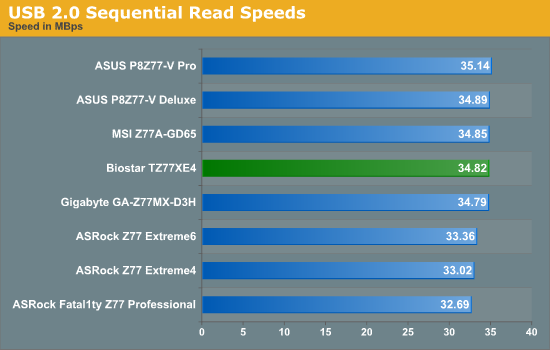
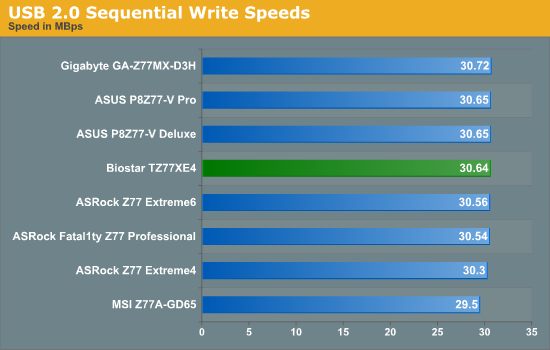
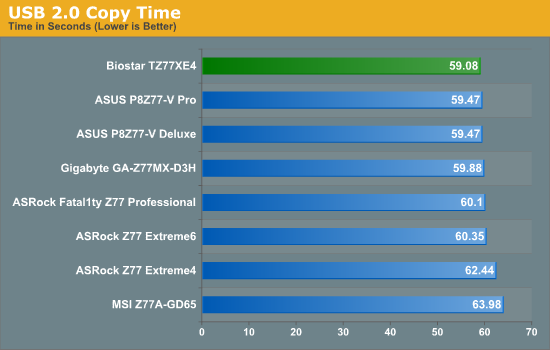
Typically, nothing much separates USB 2.0 speed between the motherboards. As we can see, in pure sequential read and writes, the Biostar is mid-pack. However, it does take top spot during our copy test of default USB controller and drivers, indicating better small-file performance.
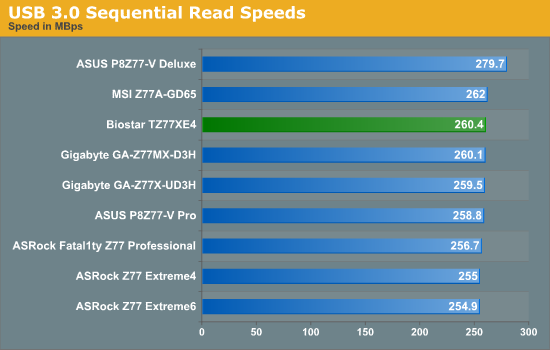
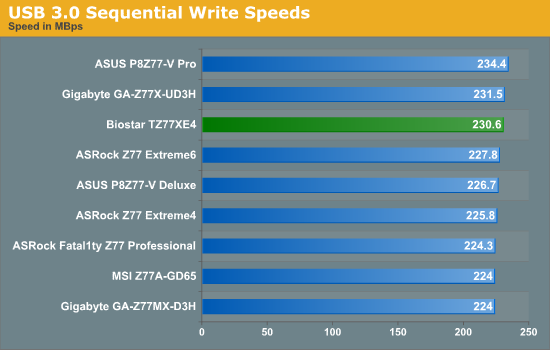
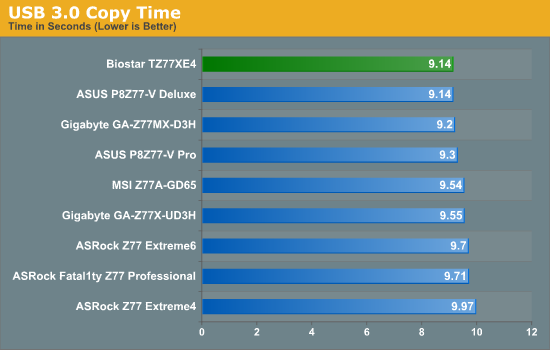
Similarly, with USB 3.0 performance, nothing much stands out regarding the Biostar in terms of sequential reads and writes, but it hits the nail on the head during our copy testing.
SATA Testing
We also use CrystalDiskMark for SATA port testing on a C300 drive. The sequential test (incompressible data) is run at the 5 x 1000 MB level. This test probes the efficiency of the data delivery system between the chipset and the drive, or in the case of additional SATA ports provided by a third party controller, the efficiency between the controller, the chipset and the drive.
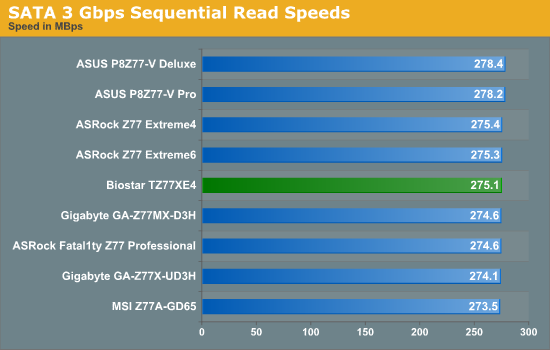
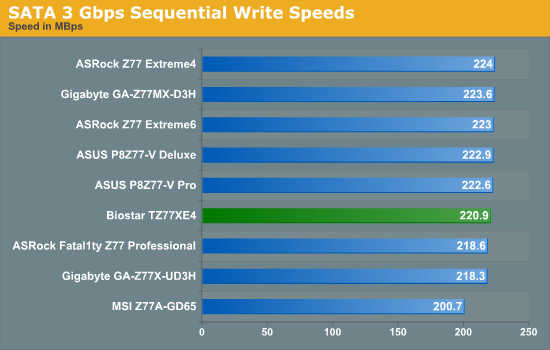
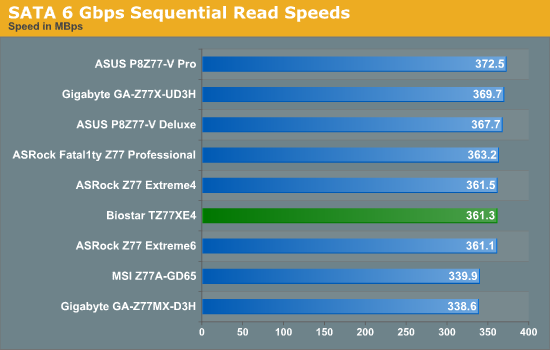
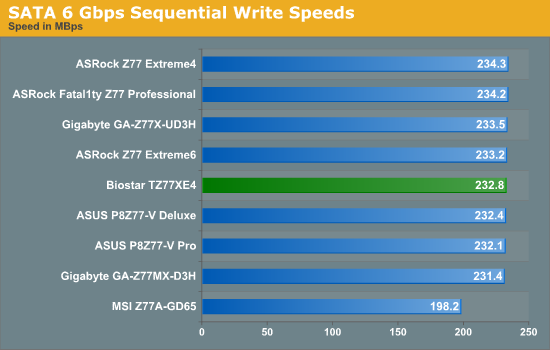
No upsets during SATA testing, with the Biostar still being very middle of the pack.
DPC Latency
Deferred Procedure Call latency is a way in which Windows handles interrupt servicing. In order to wait for a processor to acknowledge the request, the system will queue all interrupt requests by priority. Critical interrupts will be handled as soon as possible, whereas lesser priority requests, such as audio, will be further down the line. So if the audio device requires data, it will have to wait until the request is processed before the buffer is filled. If the device drivers of higher priority components in a system are poorly implemented, this can cause delays in request scheduling and process time, resulting in an empty audio buffer – this leads to characteristic audible pauses, pops and clicks. Having a bigger buffer and correctly implemented system drivers obviously helps in this regard. The DPC latency checker measures how much time is processing DPCs from driver invocation – the lower the value will result in better audio transfer at smaller buffer sizes. Results are measured in microseconds and taken as the peak latency while cycling through a series of short HD videos - under 500 microseconds usually gets the green light, but the lower the better.
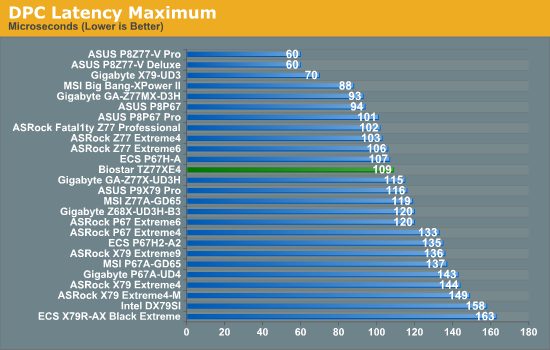
While not the best ever board in our DPC testing, the Biostar clocks in at 109 microseconds, well within the green zone in the test.










28 Comments
View All Comments
Epicac - Saturday, July 21, 2012 - link
I've heard horror stories from Biostar and ECS Motherboard owners. Even a cheap board from either of these manufacturers wouldn't tempt me.StevoLincolnite - Saturday, July 21, 2012 - link
Peace of mind goes a long way!Snotling - Saturday, July 21, 2012 - link
I deal toasted PC components every week... motherboards, videocards, DVD players, hard drives. As far as I know they (Biostar) are no worse than Asus or any other actually. for the exception of one biostar Mobo that was DOA I can't remember seeing one that was defective.They are great for repairs because you can usually get that 4 year old Biostar Mobo "new" at retailers when all other makers are only available used.
Olaf van der Spek - Saturday, July 21, 2012 - link
I've heard horror stories from Asus and Gigabyte owners.....yyrkoon - Sunday, July 22, 2012 - link
So basically, you're posting only to spread F U D ? I've heard lots of things. That I do not repeat because I have no personal experiences. But along those lines. I suppose any idiot who hasn't a clue how to build a system can relate many horror stories. Hell, when I first started building my own systems back in the early 90's. I completely destroyed a brand new hard disk. By low level formatting the drive from the BIOS.Not only that. When ABIT was still in the motherboard business. I had read many "stories" of how people had such a hard time with their boards. Yet . . . I've been a long time ABIT motherboard "fan". Why ? I always knew what to expect from their products, and they were always very stable .
@Snotling
Yes, I agree. Except my own personal experiences would leave me to believe that BIOSTAR > Asus. Like you. I received DOA parts. Except it was not just one. It was four in a row through two different dealers.
Then for personal parts. I will not even touch their budget brand sister company. The reason why is simple. Based on a review from this very same site. I went out and bought a system board for my budget PC. I experienced several problems. Some of which were correctable. Some which were fatal flaws. Such as the PC locking up after 2-5 days ( completely random ). Having spent two weeks on the phone and emailing tech support I called no joy, and started looking for another board. Then wouldn't ya know. when replaced with an ABIT board ( that even cost less ). All the problems went away. That was 6-7 year ago. The system still runs rock solid to this day.
The last system I built for myself was based on an ABIT IP35-E motherboard. This system is also running to this day. Zero crashes, unless I was doing something I should not have been doing. Such as pushing an overclock too far . . .
So yeah I am a bit biased when it comes to name brands. I would never touch asrock, unless a customer insisted. I do not use Asus motherboards in any of my own systems, and strongly recommend against customers using them( if asked ). However. My own personal laptop is branded Asus . . . and I love it. Go figure lol.
AVP - Saturday, July 21, 2012 - link
I've had better luck with biostar than abit or asus.Wixman666 - Monday, July 23, 2012 - link
I've sold plenty of every type of board under the sun over the years and Biostar boards are no worse than any other as far as QC goes. ECS are the worst however, historically speaking, on their budget line at least.najames - Tuesday, July 24, 2012 - link
I built an ECS AMD socket 754 system, sent it to my brother years ago, and they are still using it today.The best motherboard I've ever owned since the mid 80s has been a little Biostar T series board with a dinky AMD dual core, happily overclocked if asked. I reluctantly sent it to my nephew when his system crapped out and he is still using it today AFAIK.
My current collection of Asus, Gigabyte, and Intel boards are no better/worse. They likely just have some better features.
ggathagan - Tuesday, July 24, 2012 - link
While most motherboard makers have had periods of bad QC, the chipset involved always has to figure into the mix, whether you look at stability or flakiness.Without factoring that into the equation, one bad experience with a big name brand is no more indicative that a rock-solid experience with a lesser-known brand.
The fact that everyone (chip designers, fab work, motherboard makers and end-users) is always pushing for more performance in shorter spans of time does no one any favors, but we all persist in that approach.
As such QC history can vary widely at any company.
johnsmith9875 - Saturday, August 11, 2012 - link
I tossed my flaky, cranky genuine intel board and bought a biostar and haven't looked back since.I think Biostar has improved significantly over the years, its no longer down there in PCChips territory.